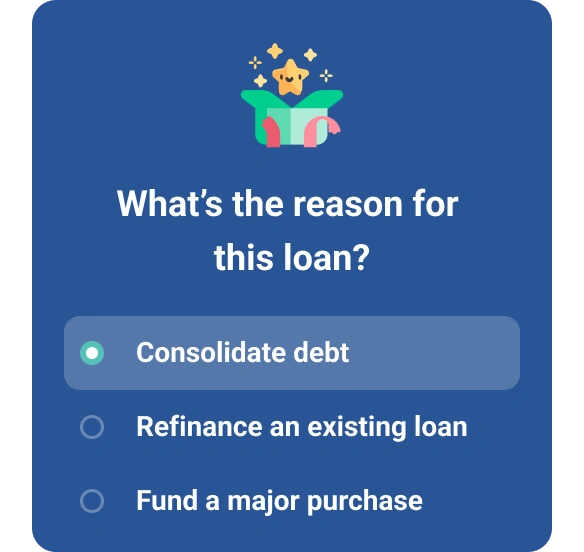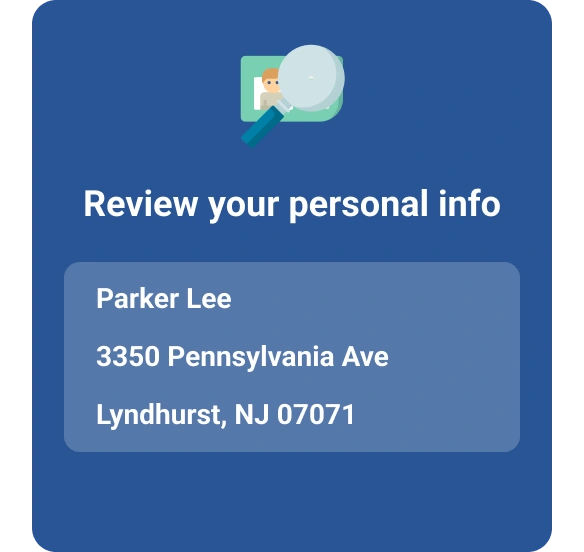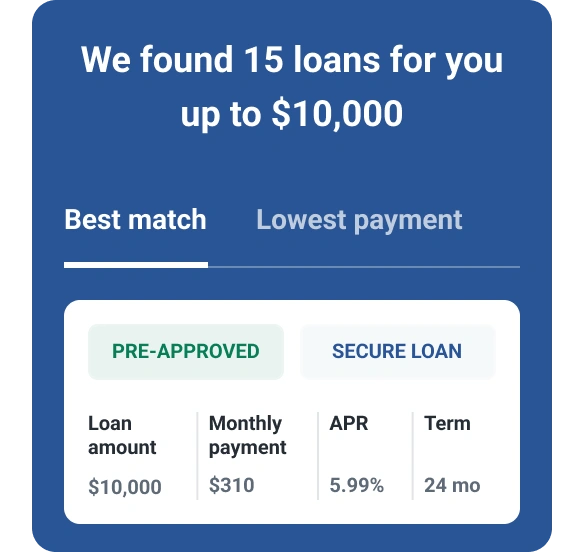How to Get Emergency Money
Quick Answer
You can get emergency money through a personal loan, credit card cash advance or payday loan. However, some of these options aren’t ideal and can cost you a lot of money. You can also consider asking family or friends for money, using a 0% intro APR credit card or tapping into a HELOC.

Unexpected curveballs and financial emergencies are a guaranteed part of life, but how you weather these crises can vary drastically based on how prepared you are.
If you haven't had the time, resources or knowledge required to get ready for what's next, you might need to look for outside assistance. Let's go over some of your options for where to get financial help in an emergency and how to be prepared for the next one.
3 Types of Emergency Loans
| Loan Amount | Repayment Term | Annual Percentage Rate (APR) | |
|---|---|---|---|
| Personal loan | $1,000 - $50,000 (with some offering up to $100,000) | Typically 12 - 60 months | Generally 6% - 36% |
| Credit card cash advance | Limited by your issuer, typically less than your card's credit limit for purchases | Paid down when you make your monthly credit card payments | Varies; typically much higher than your card's purchase APR |
| Early payday app | $25 to $750 | By your next payday | Generally no interest, but there can be fees for things like expedited funds |
1. Personal Loans
Personal loans are installment loans that you can use for just about anything, including for a large purchase, debt consolidation or emergencies.
You might find a personal loan with a variable interest rate, but most are fixed. Depending on the lender, terms may be available from a few months to five years or even longer. Approved borrowers receive a lump sum upfront that's repaid in fixed installments over the term, making payments predictable.
Pros:
- For those with excellent credit, interest rates could be low, such as in the single digits.
- Personal loans typically allow you to repay the debt over several years, so you don't have to worry about coming up with an immediate lump-sum payment.
- Many personal loan lenders, particularly online-only lenders, offer next-day or even same-day funding if you're approved. (Others may take an extra day or two, which may require you to make other accommodations in the meantime.)
Cons:
- Some banks and credit unions don't offer personal loans.
- Some lenders only work with borrowers with good or excellent credit; those who work with borrowers whose history is only fair charge higher interest rates, perhaps as high as 35% or more.
- Some short-term personal loans may be available if you have bad credit, but their interest rates can be very high—some lenders charge annual percentage rates (APRs) in the triple digits.
Learn more: Best Personal Loans
2. Credit Card Cash Advances
A cash advance is a short-term cash loan that you borrow against your credit card limit. It may be a decent option if you have bad credit and few affordable financing options. The APR on cash advances is typically higher than your purchase APR, however, and you'll pay a fee for the privilege of borrowing against your credit card.
Pros:
- There's no credit check since you already have the credit line in place.
- You can get the money instantly through an ATM or in person at a branch, and possibly online.
Cons:
- Credit card cash advance APRs are often higher than your credit card's APR on purchases.
- Interest starts accruing immediately, meaning there's no grace period on cash advances like you get with purchases.
- Credit card cash advances typically come with an upfront fee, which is a small percentage of the advance amount.
- Some issuers have a cash advance limit that's lower than your regular credit limit.
3. Early Payday App
Early payday apps are a type of short-term loan that allows you to borrow in advance of your paycheck. Payday app loans tend to be for relatively small amounts of money (such as $50 to a few hundred dollars), and repayment is due when you get your paycheck.
Early payday apps link to your bank account to gather information on your cash flow—specifically, how much and when you get paid. Unlike conventional personal loans, which pull your credit to qualify you, early payday apps may not require a credit check at all.
Some early payday apps, such as EarnIn, are open to anyone to use. Others may require your employer to register for the app and offer it to employees as a benefit.
Pros:
- Early payday apps typically have lower fees than more expensive options, such as payday loans. Some apps charge no interest or fees but offer the option to tip.
- Early payday apps use data from your bank or your employer to determine your eligibility, so there's typically no credit check.
Cons:
- Early payday apps may charge interest and fees.
- There may be additional fees for fast funding.
- You won't build credit because early payday apps don't typically report payments.
- Repayment could lead to overdrawing your bank account.
- Borrowing in advance of your paycheck can lead you into a debt cycle. Feeling stuck in debt is stressful, and digging your way out can be a challenge (a credit counselor could help).
Learn more: 5 Paycheck Advance Apps to Help You Get Paid Early
Other Sources of Emergency Money
If none of the above emergency loan options are a good fit, here are some other ways to find cash urgently.
Friends or Family Members
Asking to borrow money from loved ones can be a tough decision that shouldn't be taken lightly. But in a financial emergency, it might be your best bet, especially if this option is faster and less expensive than others.
If you go this route, it helps to treat it just like you would a bank loan. Iron out mutually agreeable repayment terms and any potential interest ahead of time, then create and sign a loan agreement. Having it formalized can instill confidence in your loved one and reduce chances of future conflict for both of you.
Learn more: How to Borrow Money From Family and Friends
0% Intro APR Credit Cards
If you have good or excellent credit, you may be able to qualify for a credit card that offers an introductory 0% APR promotion. Depending on the card, you could use it for emergency expenses and get anywhere from six to 20 months to pay it off interest-free. Just be sure to create a plan to pay off the debt before the promotional period ends. Otherwise, you'll owe the regular (and higher) interest rate on the remaining balance.
Keep in mind that it may take a week or two to receive your card in the mail after you've been approved. If you need the money sooner, contact the card issuer before you apply to see if they can expedite delivery. Some card issuers may even offer to provide instant access to your credit card information.
Learn more: How Do Intro 0% APR Credit Cards Work?
Home Equity Line of Credit (HELOC)
A HELOC is a revolving line of credit that's secured by the equity you've built in your home. If you already have one in place, accessing that credit line may be as simple as using the debit card tied to it or writing a check.
HELOCs typically offer interest rates in the single digits because they're secured by collateral. The downside is that if you don't already have one in place, a new HELOC can take several weeks to close, which may not be ideal for an emergency.
Some HELOC lenders may charge high closing costs, as well as annual fees, so shop around and compare options. One of the greatest risks of using a HELOC is that if you fail to pay back the debt, you could lose your home. HELOCs typically have long repayment terms, but it's still a risk to consider.
Learn more: What You Need to Know About HELOCs
Payday Loans
Payday loans are small-dollar loans with very short repayment terms and steep fees and interest rates. They're offered by non-traditional lenders and typically don't require credit checks, which can help those with bad credit.
However, with the short repayment term and steep interest rate and fees, some borrowers can't repay their payday loan on time and roll over or reborrow it—leading to a cycle of debt they may have difficulty getting out of. For that reason, some states have banned or highly regulated payday loans, and they should be an option of last resort.
How to Get Financial Assistance
When you need help getting through a tough financial spot, there are several places to turn. A credit counselor can help you make a budget that addresses your debt payments, advise you on repayment strategies and even negotiate directly with your creditors. When you work with a nonprofit credit counseling organization, their services are free or have low fees.
You can also hire a local personal finance counselor or certified financial planner to help you get your finances in a more manageable spot.
If you need relief more than advice, call 211 to get free, confidential guidance on finding and accessing financial services and benefits. Their team may be able to point you in the right direction when you need help meeting needs for food, housing, health care and transportation.
There are also various programs through the government and charities that offer financial assistance.
Learn more: How Can 211 Help With My Finances?
How to Get Help if You're Struggling With Debt
When your debt feels like it's spiraling out of control, here are some aggressive measures you can take.
- Consolidate debts. If part of your debt struggles are due to high interest rates, and you have good credit, consider consolidating your debts through a loan or balance transfer. This entails getting a 0% intro APR balance transfer card, or a low-interest personal finance loan, to pay off high-interest debts. Then you'll pay off that one debt, which should be at a lower interest rate.
- Get on a debt management plan (DMP). Visit a credit counselor and ask about a DMP, a type of repayment plan for someone inundated with debt. In a DMP, the counselor may negotiate with your creditors to waive fees, reduce interest rates and bring your past-due accounts current. It requires closing your credit cards that are part of the plan. You'll then make one monthly payment to the credit counselor, and they'll pay your creditors, typically aiming to have your debts paid off between three and five years.
- Consider debt settlement. If you've missed some payments on an unsecured debt, you can try to negotiate with your creditors to settle it for less than what you owe. This is usually a last resort before filing for bankruptcy since it doesn't always work, and it can really hurt your credit. You can attempt a debt settlement on your own, with a debt settlement company or a law firm.
How to Prepare for the Next Emergency
Before your next unexpected financial curveball, here are some ways to get ready:
- Create an emergency fund. Set aside money in a dedicated savings account—ideally three to six months of living expenses—that you only tap in true financial disasters. Think a broken-down car, job loss, unexpected medical bill or emergency vet visit. Having a robust emergency fund helps you avoid taking on debt or pulling from retirement accounts.
- Stick to a budget. When you make a budget and stick to it, it can help you keep spending in check, pay off debt, afford all your bills and minimize the need for new debt. If an emergency hits, your finances should already be in decent shape—and if needed, you can adjust your budget to cut costs and free up more for urgent expenses. This is easier than creating a budget from scratch mid-crisis.
- Have adequate insurance. Make sure you have up-to-date car insurance and renters or homeowners insurance (and possibly pet insurance), and closely review the policies to see if it's worth increasing coverage. For example, you might check and realize your car insurance only covers liability, leaving you high and dry if your car is damaged in a weather event. It could be worth adding comprehensive and collision insurance, despite the extra cost, to protect you from a steep bill later.
Learn more: How Much Money Should You Have in Your Emergency Fund?
Frequently Asked Questions
The Bottom Line
As you work on preparing for future financial emergencies, including improving your credit score, continue to monitor your credit score to make sure you don't experience any more surprises. If you see your score dip, check your credit reports to see what may have caused it and look for ways to set things right.
Your ongoing efforts can help you maintain a stable financial foundation that can protect you and your loved ones in the future.
Need a personal loan?
Whether you're looking to eliminate debt or access cash fast, compare personal loan offers matched to your credit profile.
Start now for freeAbout the author
Emily Starbuck Gerson is a freelance writer who specializes in personal finance, small business, LGBTQ and travel topics. She’s been a journalist for over a decade and has worked as a staff writer at CreditCards.com and NerdWallet. Emily’s work has appeared in CNBC, MarketWatch, Business Insider, USA Today, The Christian Science Monitor and the Chicago Tribute, among other websites and publications.
Read more from Emily Starbuck

